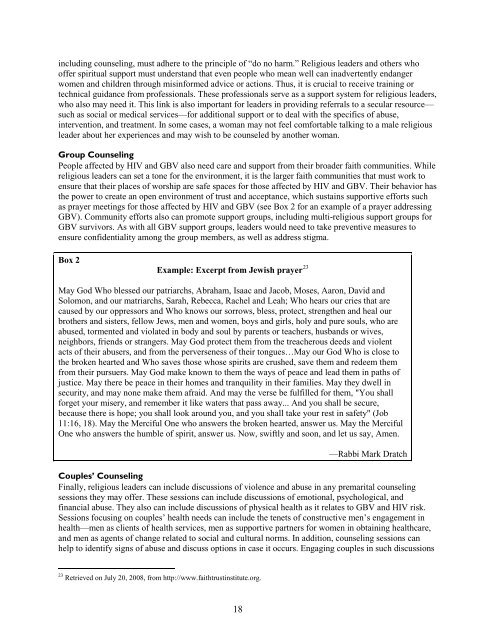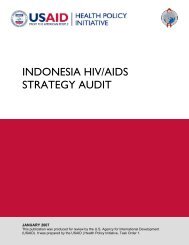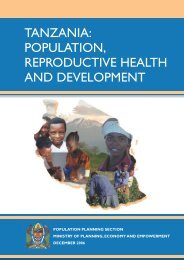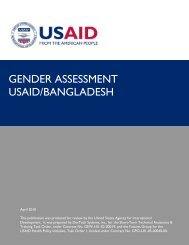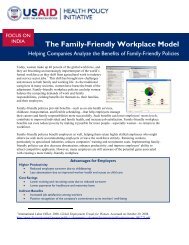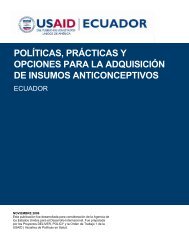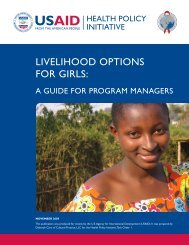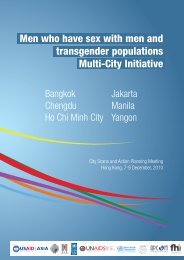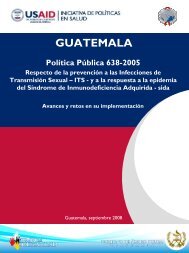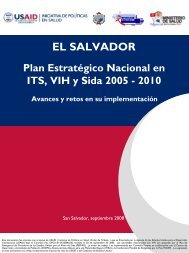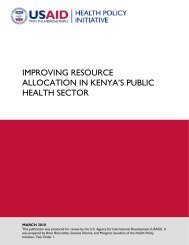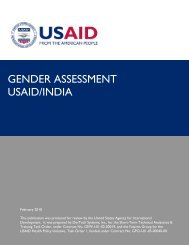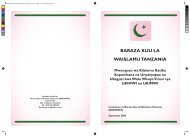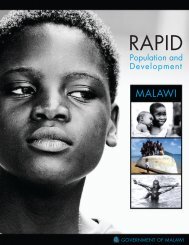A Call to Act - Health Policy Initiative
A Call to Act - Health Policy Initiative
A Call to Act - Health Policy Initiative
Create successful ePaper yourself
Turn your PDF publications into a flip-book with our unique Google optimized e-Paper software.
including counseling, must adhere <strong>to</strong> the principle of “do no harm.” Religious leaders and others who<br />
offer spiritual support must understand that even people who mean well can inadvertently endanger<br />
women and children through misinformed advice or actions. Thus, it is crucial <strong>to</strong> receive training or<br />
technical guidance from professionals. These professionals serve as a support system for religious leaders,<br />
who also may need it. This link is also important for leaders in providing referrals <strong>to</strong> a secular resource—<br />
such as social or medical services—for additional support or <strong>to</strong> deal with the specifics of abuse,<br />
intervention, and treatment. In some cases, a woman may not feel comfortable talking <strong>to</strong> a male religious<br />
leader about her experiences and may wish <strong>to</strong> be counseled by another woman.<br />
Group Counseling<br />
People affected by HIV and GBV also need care and support from their broader faith communities. While<br />
religious leaders can set a <strong>to</strong>ne for the environment, it is the larger faith communities that must work <strong>to</strong><br />
ensure that their places of worship are safe spaces for those affected by HIV and GBV. Their behavior has<br />
the power <strong>to</strong> create an open environment of trust and acceptance, which sustains supportive efforts such<br />
as prayer meetings for those affected by HIV and GBV (see Box 2 for an example of a prayer addressing<br />
GBV). Community efforts also can promote support groups, including multi-religious support groups for<br />
GBV survivors. As with all GBV support groups, leaders would need <strong>to</strong> take preventive measures <strong>to</strong><br />
ensure confidentiality among the group members, as well as address stigma.<br />
Box 2<br />
Example: Excerpt from Jewish prayer 23<br />
May God Who blessed our patriarchs, Abraham, Isaac and Jacob, Moses, Aaron, David and<br />
Solomon, and our matriarchs, Sarah, Rebecca, Rachel and Leah; Who hears our cries that are<br />
caused by our oppressors and Who knows our sorrows, bless, protect, strengthen and heal our<br />
brothers and sisters, fellow Jews, men and women, boys and girls, holy and pure souls, who are<br />
abused, <strong>to</strong>rmented and violated in body and soul by parents or teachers, husbands or wives,<br />
neighbors, friends or strangers. May God protect them from the treacherous deeds and violent<br />
acts of their abusers, and from the perverseness of their <strong>to</strong>ngues…May our God Who is close <strong>to</strong><br />
the broken hearted and Who saves those whose spirits are crushed, save them and redeem them<br />
from their pursuers. May God make known <strong>to</strong> them the ways of peace and lead them in paths of<br />
justice. May there be peace in their homes and tranquility in their families. May they dwell in<br />
security, and may none make them afraid. And may the verse be fulfilled for them, "You shall<br />
forget your misery, and remember it like waters that pass away... And you shall be secure,<br />
because there is hope; you shall look around you, and you shall take your rest in safety" (Job<br />
11:16, 18). May the Merciful One who answers the broken hearted, answer us. May the Merciful<br />
One who answers the humble of spirit, answer us. Now, swiftly and soon, and let us say, Amen.<br />
—Rabbi Mark Dratch<br />
Couples’ Counseling<br />
Finally, religious leaders can include discussions of violence and abuse in any premarital counseling<br />
sessions they may offer. These sessions can include discussions of emotional, psychological, and<br />
financial abuse. They also can include discussions of physical health as it relates <strong>to</strong> GBV and HIV risk.<br />
Sessions focusing on couples’ health needs can include the tenets of constructive men’s engagement in<br />
health—men as clients of health services, men as supportive partners for women in obtaining healthcare,<br />
and men as agents of change related <strong>to</strong> social and cultural norms. In addition, counseling sessions can<br />
help <strong>to</strong> identify signs of abuse and discuss options in case it occurs. Engaging couples in such discussions<br />
23 Retrieved on July 20, 2008, from http://www.faithtrustinstitute.org.<br />
18


